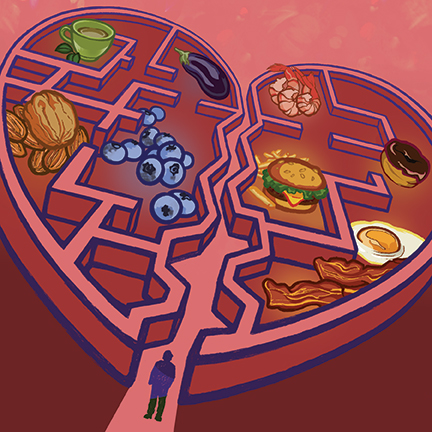A Season of Mixed Feelings
The Elliot’s bereavement services help families find comfort, connection and hope after loss

There are carols on the radio and twinkling lights reflected in the snow; by all appearances, things are merry and bright. But for those who are facing a holiday season with an empty seat at the table, loss can cast a shadow over the festivities.
Coping with grief can feel overwhelming at any time, but the emotions of the holidays can make it especially difficult. Support is available through The Elliot VNA Hospice Bereavement Program.
“The holidays are such emotionally full seasons, with lots of highs and joy, but when someone significant is missing, it leaves a void that you really can’t mask,” says Chuck Johnson, Elliot VNA bereavement coordinator.
Support Beyond Hospice Patients
The Elliot’s bereavement team guides families from the time a patient first enters hospice through their passing. Services aren’t limited to Elliot patients — anyone in the community can receive support.
“We often associate grief and bereavement with death, which is literally how it’s defined,” Chuck says. “But we also start grieving whenever there’s any kind of significant loss or change, like a change in schools, a change in home situations, divorce or moving. All those significant stressors of life can trigger a grief response, and especially in hospice, when they find out that they suddenly have this terminal disease, they will start grieving.”
Chuck and Theresa Bianchi, a second bereavement coordinator, provide resources to caregivers and families through the hospice program and will check in with the primary bereaved person for more than a year following the death of a loved one. They will receive monthly correspondence with tips and resources, and they can participate in one-on-one counseling sessions. A team of volunteer grief companions field phone calls for anyone who simply needs a neutral listener without trying to fix or advise.
You Don’t Have to Grieve Alone
Chuck says about 90% of those who receive bereavement support attend one of The Elliot’s free drop-in bereavement support groups. A women’s group meets on the first and third Fridays of the month, and a men’s group on the fourth Friday of the month.
Twice a year, in May and November, The Elliot hosts a memorial service and those receiving bereavement support can submit the name of their loved one to be read. There is music and reflection, and as each of the 120 to 150 names is read, a bell is rung for them.
“That’s a very meaningful time for people,” Chuck says.
Grief Has No Timeline
Grief has no standard timeline, so whether the death of a loved one was recent or years ago, anniversaries, birthdays, and family celebrations can be painful reminders of the absence. Yet, there’s a social expectation that you should feel happy or at least pretend to be cheerful.
Research underscores just how widespread these feelings are. According to the American Psychological Association, 38% of people say their stress increases during the holiday season. An Experience Camps/Harris poll showed 36% of those surveyed had no interest in celebrating the holidays due to grief. For people who have lost a partner, disinterest in attending events you used to do as a couple can lead to feelings of irritability or wanting to isolate.
How to Support Someone Who’s Grieving
Chuck offers some practical tips for supporting someone who may be grieving this holiday season:
- Stay connected: Death can make people uncomfortable, and so they avoid talking about it or deceased loved ones. However, allowing the bereaved to express their sadness, without trying to cheer them up, can remove some of the pressure they may be feeling.
“It’s doing things that can specifically recognize together and accept the loss,” Chuck says. “Sometimes people say, ‘Well, I don’t want to say anything, because I don’t want everybody to get sad.’ Everybody’s already sad; they’re just not expressing it. Go ahead and express it, and then it allows everybody to support each other.” - Anticipate needs: Many people offer general help after a death, but that just puts the bereaved person in a position where they have to delegate. Bring over dinner, help with laundry or mow the lawn without being asked.
- Honor the memory: Even though the deceased may not be physically part of holiday celebrations, a family can find ways to add their presence. Some may leave a chair open for them at dinner, set up a photo or a memorial, or support a cause that was championed by their loved one.
- Accept differences: Each person will grieve in their own way. “There is no given timeline for when and how a person should be grieving, so that they shouldn’t be done in X amount of days or weeks or months,” Chuck says. “It’s different for each person. To presume that, or to project that, is really a disservice to the person, and it shows a lack of sensitivity.”
Grief may fade or have flare-ups, but even if it never fully disappears, there are resources to support families and help them find peace in the holiday season. Those looking to connect with support are invited to fill out the registration form at elliotvna.org/bereavement-support.
The holidays are hard enough; The Elliot VNA Bereavement Team is here so you don’t have to grieve alone. To learn more or find a support group, visit ElliotVNA.org.













